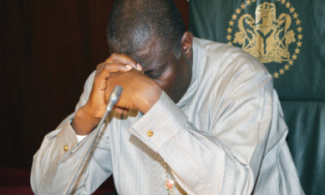
Although there is corruption in some sectors of the Nigerian government, the situation is not as bad as is being portrayed, President Goodluck Jonathan said on Sunday during his fifth presidential media chat.
Although there is corruption in some sectors of the Nigerian government, the situation is not as bad as is being portrayed, President Goodluck Jonathan said on Sunday during his fifth presidential media chat.
googletag.cmd.push(function() { googletag.display('content1'); });
For almost two hours on Sunday evening, Mr. Jonathan responded to questions from journalists and Nigerians on Twitter on various national questions ranging from insecurity, power, 2015 elections to cost of governance, and corruption.
While speaking on corruption, Mr. Jonathan said his government was winning the war against corruption, and that the perception people had about corruption in Nigeria was exaggerated.
“Perception is different from reality,” the president said, saying even the Transparency International, TI, corruption rating was a Corruption Perception Index.
googletag.cmd.push(function() { googletag.display('content2'); });
The latest TI rating had ranked Nigeria as one of the most corrupt countries in the world.
The president argued that the global perception about Nigeria’s corruption was influenced by continuous Nigerian media reports and those by civil society groups in the country.
Mr. Jonathan’s claim that corruption in the country was still at a tolerable level came amidst several corruption allegations against officials of his administration.
Unsolved corruption cases
Among the unresolved corruption cases facing the Jonathan administration is its handling of the Malabu $1.1 billion scandal.
The Jonathan administration approved the transfer of the money to Malabu, a company controlled by convicted money launderer, Dan Etete, in 2011, as payment for an oil block Mr. Etete fraudulently acquired from Nigeria.
The transfer occurred despite that Nigeria’s main anti-corruption agency, the EFCC, was already investigating Malabu for registration fraud and despite Mr. Etete’s earlier conviction in France.
The money was later transferred by Mr. Etete to other dubious accounts including those owned by a politician with links to Mr. Jonathan, Abubakar Aliyu.
Nigeria’s Attorney General, Mohammed Adoke, had claimed that the country only acted as an obligor, a claim that has been proven to be false in earlier PREMIUM TIMES report.
The president’s claim also came despite the massive corruption in the petroleum sector supervised by the Minister of Petroleum, Diezani Alison- Madueke.
At least N300 billion was fraudulently collected as subsidy by petroleum marketers in 2011, with active connivance of petroleum ministry officials. Several reports including that by a presidential committee and the House of Representatives revealed the unprecedented level of corruption in the sector, with many Nigerians wondering why Mrs. Alison-Madueke remains in office.
Mr. Jonathan, however, said most of the reports on corruption in the oil industry were not factual.
“I’m not saying there is no corruption in the petroleum sector,” he added.
The president also admitted that corruption was not the major issue of concern among foreign investors; saying some investors recently listed corruption as the third most important challenge they face in doing business in Nigeria.
Corruption efforts/successes
The president said even before the federal lawmakers began investigating the corruption in the oil sector, particularly that concerning the petroleum subsidy scam, his administration had begun efforts to check graft in the sector.
While speaking on other efforts being made to tackle corruption, Mr. Jonathan said he and Vice President Namadi Sambo were having regular meetings with the heads of the judiciary, legislature, and anti-corruption bodies in order to holistically address corruption.
“We are interested in making sure that there is no free money for you to steal,” Mr. Jonathan said.
While addressing the slow pace of some corruption trials by the courts, the president said he would not interfere in the running of separate arms of government.
“As a president you cannot gag the judiciary… you must allow the judiciary to be independent,” he said.
High cost of government
Mr. Jonathan also answered questions on the high cost of governance in Nigeria, saying he did not believe the cost of governance was too high.
The president was responding to a question by a panelist on the high number of ‘unnecessary aides’ by some ministers and other officials of government and how it worsened the cost of governance.
“We are doing very well in terms of that (managing the cost of running government),” Mr. Jonathan said.
He argued that ministers and other presidential officials only hired people they needed.
“If you are a minister, you need people that are competent to help you,” he said.
The president argued that governance could not be run like a business, saying “if you want to run government as you run a modern business, you will even have more problems”.
Mr. Jonathan also argued that the cost of governance in Nigeria was not as high as that of some other countries, saying “people (those complaining) don’t compare notes.”
googletag.cmd.push(function() { googletag.display('comments'); });